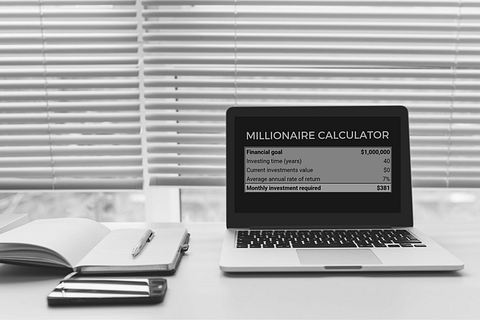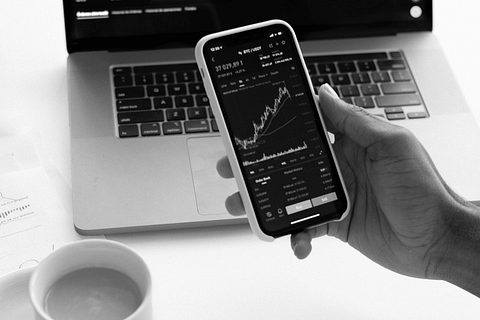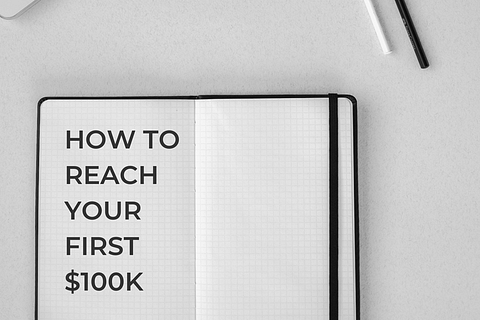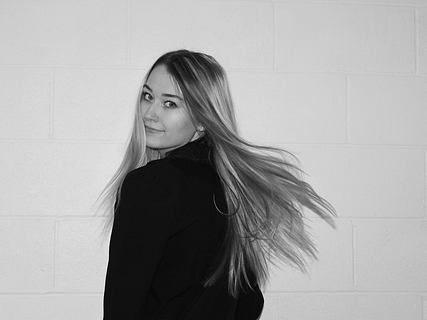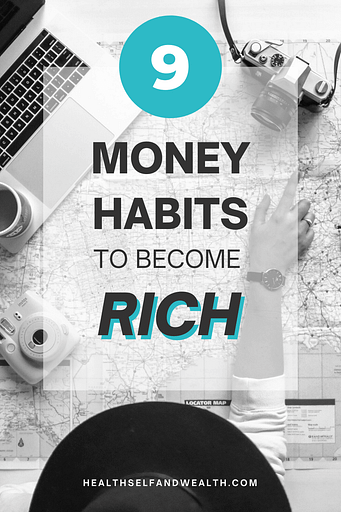
Does luck play the biggest role in our financial success or do we make our own luck? If you’re a millennial, “luck” may even be working against you, as millennials were put in one of the worst financial situations throughout time. However, you can change your trajectory for the better by building strong financial habits. If you want to make your own luck, here are 9 money habits to set yourself up for financial success.
- Define your goals and money habits
- Pay off full credit card statement balance monthly
- Pay off high-interest debt
- Build an emergency fund
- Invest early and often
- Automate whenever possible
- Invest in yourself
- Track your financial outcomes monthly
- Create a financial education plan
These 9 money habits have transformed my financial journey, and they will help you too. They will help you get rich over the long term.
Please note: I am not a licensed financial advisor. This information is for educational purposes only and is NOT advice. Every individual has a unique situation. Always do your own research before making any decision.
Define your goals and money habits
At Health Self and Wealth, personal finance is about more than just money. Personal finance provides the means to live the life you most desire. That’s why the most important money habit is defining your lifestyle goals, then setting the money goals to live that life.
Every money goal should be rooted in your lifestyle goal. This will do two main things:
- It clarifies the most important money decisions to reach your dream lifestyle.
- It motivates you because you’re no longer working towards a money goal because you feel like you should. Instead you’re building your dream life.
Now it’s your turn. Think about what your ideal lifestyle looks like. What would you need financially to make it happen?
Here are 5 free journal prompts for exploring your dream life.Whatever your lifestyle and financial goals are, all the best money habits below will help you reach them. You may even already do some!
Pay off full credit card statement balance monthly
Having a credit card is NOT a bad financial decision, as long as you develop this one habit. Furthermore, if you can commit to paying off the full statement balance monthly, a credit card helps you by building your credit score.
Having a good credit score shows lenders and companies they can trust you. Your credit score determines your rates on loans and required security deposit for apartments, gas, electric, cable, etc.
Adopt the right mindset of a credit card: use your credit card the same way you’d use your debit card.
That means only buy what you can afford to pay off. Do not spend more than you can repay.
Lastly, repay the full statement balance of your credit card each month. This habit will ensure you never get into high-interest debt. I’ve had a credit card for 3 years and I’ve never missed a payment, so I’ve never had to repay more than what I’ve bought. If you’re concerned about forgetting to pay your balance, you can set up automatic repayments.
If you use a credit card like mine, you can actually get paid for spending as you usually would! I’ve had the Discover cash back card for one year, and within my first year, I earned $98.30 in cash back.
With this card, they offer 5% cash back on select purchases and 1% on all other purchases. For example, last year they offered 5% cashback on restaurants and gas stations. At the end of the first year, they also match all the cash back earned.
Finally, this Discover card does not have any fees. It was completely free for me to use AND I earned almost $100 in cash back for using it. On top of that, they offer fraud protection, so you never pay for unauthorized purchases.
If you are considering opening a credit card, would you want an extra $100 just for opening the card and making your first purchase? If so, I have a special offer for you.
I will send you my Discover referral link with information about the card and the application. If you decide to apply through my link, you will get $100 cash back after you’re approved and you make your first purchase. (I will also get $100 cash back at no cost to you.)
Request your referral link here. I only have 5 referrals remaining, so first come first serve!Pay off high-interest debt
High-interest debt typically comes from carrying a balance on credit cards. If you are in this boat, that’s okay! The most important money habit you can develop is paying off your debt as quickly as possible. Compound interest is working against you here and your debt will grow exponentially.
That’s why it’s important to kill this high-interest compounding beast as quickly as possible! Here are some steps you can take:
- Stop accumulating more debt. Avoid spending more than you can repay each month.
- Look into your spending habits. Could you adjust your spending to pay this debt off faster? As a starting point, here are 5 easy and painless ways to lower your spending instantly.
- Pay off more than your minimum payment. Because this debt is growing rapidly, the faster you can pay it off, the better!
Another great habit to pair with this one is to track your financial outcomes monthly. The Personal Finance Planner connects your debt payoff to your net worth growth. Check out if it’s right for you here.
Build an emergency fund
If you unexpectedly had a $400 expense this month, do you have emergency savings to pay for it? If you said no, you aren’t alone. According to a 2021 BankRate study, the majority of women (57%) don’t have enough savings to cover 3 months of expenses. Although, the majority of men do.
An emergency fund is savings to cover unexpected expenses or unexpected income loss. Typically experts recommend saving between 3 and 6 months of expenses for emergencies. This money is NOT invested. It is easily accessible, like in a bank savings account.
If you already have an emergency fund, amazing – you are ahead of the curve! If you don’t have an emergency fund, this is one of the best financial habits to start building.
If you don’t have an emergency fund, decide what account you will use to store your savings. Choose an account that is federally insured under the FDIC and one that does NOT have monthly fees. Ensure the minimum balance required is either $0 or an amount you can sustain.
The account should be easily accessible, like a savings account. But it shouldn’t be too easily accessible that you’ll be tempted to spend it, like a checking account.
Once you’ve opened an account, automate transfers to this account and make this habit easy.
For example, let’s say you want to contribute $400 a month to your emergency fund. Transfer the amount to your emergency fund as soon as you get your paycheck. At the end of the year, you would have $4,800 in your emergency fund.
Your emergency savings goal will depend on your unique financial situation. Read more about how to build an emergency fund here.
Invest early and often
Do you want to retire rich with $1 million+? The earlier you start investing, the easier it is. Time is your best friend when it comes to investing.
Here’s a hypothetical story of Ashley, age 22, and Blair, age 32 to illustrate this point. Let’s say they both plan to retire at 62, earn a 7% average annual rate of return, and contribute $6,000 per year. The only difference is Ashley is starting 10 years before Blair.
| Ashley | Blair | |
| Current Age | 22 | 32 |
| Retirement Age | 62 | 62 |
| Time (years) | 40 | 30 |
| Average Annual Rate of Return | 7% | 7% |
| Annual Investment | $6,000 | $6,000 |
| Future Value | $1,197,811 | $566,765 |
| Amount Invested | $240,000 | $180,000 |
| Investing Gains | $957,811 | $386,765 |
Ashley ended with almost double the amount Blair ended with! Blair earned about $400,000 in investing gains, but Ashley earned almost $1 million!
What if Blair invested double the amount as Ashley? Any bets on who would come out ahead then?
| Ashley | Blair | |
| Current Age | 22 | 32 |
| Retirement Age | 62 | 62 |
| Time (years) | 40 | 30 |
| Average Annual Rate of Return | 7% | 7% |
| Annual Investment | $6,000 | $12,000 |
| Future Value | $1,197,811 | $1,133,529 |
| Amount Invested | $240,000 | $360,000 |
| Investing Gains | $957,811 | $773,529 |
Blair almost earns as much as Ashley if she invests double the amount. Start investing today,* so you can take advantage of letting time build wealth for you.
*If you have high-interest debt or don’t have an emergency fund, prioritize those things before investing.
These examples show TIME is the most important factor when it comes to investing. The earlier you start, the better off you are. It doesn’t even matter how much you start with, so start investing as much as you can (even if it’s $1), as early as you can.
This habit, out of all the money habits here, is the one that will make the biggest impact on building wealth.
Automate whenever possible
As humans, our brains are wired to choose the most efficient path every time. It’s why we tend to choose the path of the least effort often. It’s a survival instinct.
This isn’t a bad thing. Since we know how this works, we can use it to our advantage and work with human psychology instead of against it.
So how can you make your money habits require minimal or no effort? Automate everything you can.
- Automate your credit card bill payment.
- Automate your other bill payments.
- Automate your debt payoff.
- Automate transfers to your emergency fund.
- Automate your investments.
If you set up automation, it takes all the decision out of it. Now the easiest path is also the one that will help you reach your financial goals.
Invest in yourself
Put your well-being first. Invest in things that improve your health, self, and wealth. This may be getting a robot vacuum or purchasing a course on entrepreneurship.
If something is going to add value to your life, don’t hesitate to make that investment in yourself.
There are endless resources to help you live the life you most desire.
Track your financial outcomes monthly
If you don’t bother to track your financial outcomes, then the other money habits you implement don’t matter. I know that’s a bold take, so let me provide the psychology behind tracking progress towards goals.
Let’s say for example that Sarah has a goal to lose weight. She plans to start eating a vegetable with every meal to do so. BUT Sarah doesn’t have a scale. She doesn’t know her current weight. One month from now, Sarah has been eating a vegetable with every meal. She looks in the mirror, does not see any noticeable change in her appearance, so she quits eating vegetables. She didn’t have a scale so she couldn’t measure the impact of her habits.
If you set a financial plan or money habit without tracking your progress, you are setting yourself up for failure. Seeing progress is what motivates us to continue doing our habits.
So how can you track your progress towards your financial goals? Download the Personal Finance Planner, a comprehensive google sheets spreadsheet that connects your money decisions to your outcomes.
Your Personal Finance Planner is like the scale. It tracks your incomes, expenses, debt payoff, savings, investments, and net worth.
All you do is enter your information one time each month. Then you can immediately see the impact your habits have on your progress towards your goals.
It shows you when you’re on the right path, how to pivot if you get off track, and motivates you to keep working towards the goal.
If you want to ensure you’re on track to reach your goals, download your Personal Finance Planner here.
Create a financial education plan
Personal finance is a journey. There’s always something new to learn. Accordingly, one of the best money habits you can have is a dedication to learning more.
Maybe you want to pick out some personal finance podcasts and listen to them. Or you could make it even easier and start it right now. Subscribe to Health Self and Wealth for weekly personal finance content directly in your inbox. 😉
If you make a commitment to learning more about personal finance, this money habit will pay off exponentially over time.
Conclusion
If you start any of these 9 money habits today, you will change your financial future for the better. Especially if you track your habits, you will see the results pay off tenfold.
Which financial habit will you implement first?



